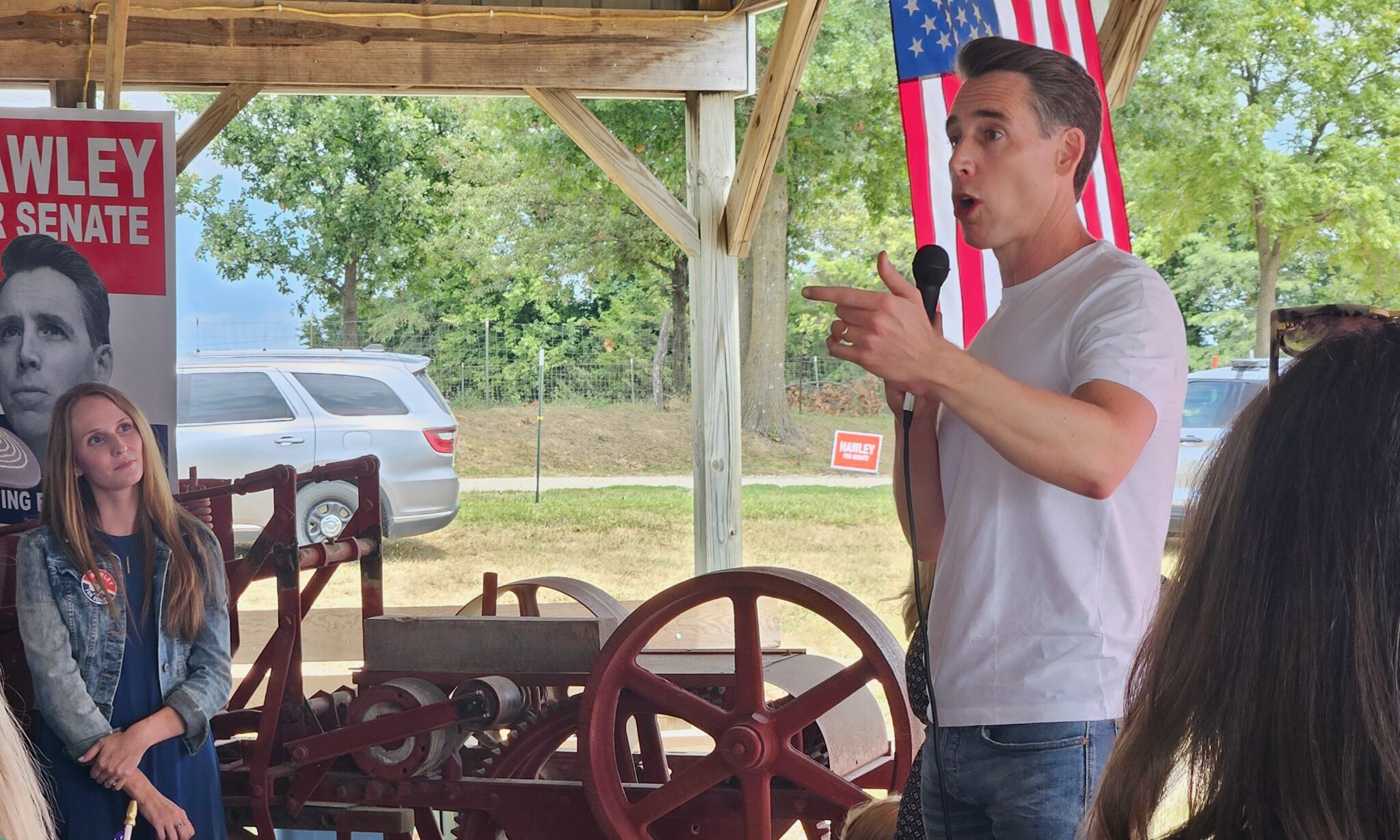Hawley, Kunce remain at impasse on Missouri U.S. Senate debates

BOONVILLE – U.S. Sen. Josh Hawley said Thursday that he will participate in moderated television debates with Democrat Lucas Kunce, but first he wants Kunce to agree to debate without moderators at the Missouri State Fair.
In response, Kunce said he will take part in the Lincoln-Douglas style debate Hawley wants, but first the incumbent Republican must agree to specific dates and hosts for future televised encounters.
That standoff left the likelihood of any meeting between the two – or one that would also include independent candidate Jared Young or Libertarian Party nominee W.C. Young – uncertain.
Hawley was unopposed and Kunce, making his second bid for a Senate seat, easily won in Tuesday’s primary election. Hawley was the first to issue a debate challenge, calling on Kunce to meet him next Thursday for a Lincoln-Douglas-style debate that would occur right after the Governor’s Ham Breakfast in Sedalia.
The Missouri Farm Bureau, which has endorsed Hawley, has offered to provide for the logistical needs, Hawley said to reporters after a campaign rally at the Missouri River Valley Steam Engine Association property near Boonville.
“I cannot believe that this guy Kunce will not just say yes to this debate opportunity with the Missouri Farm Bureau,” Hawley said. “I am doing him a favor.”
Hawley is seeking a second term in the U.S. Senate, defending a seat he won in 2018 from Democratic U.S. Sen. Claire McCaskill. Kunce lost the 2022 Democratic primary to beer heiress Trudy Busch Valentine, who was defeated in November by then-Attorney General Eric Schmitt.
Kunce has outraised Hawley since entering the race and is the best-funded Democrat running statewide. Hawley holds a cash advantage built on fundraising prior to the start of 2023.
Both candidates have begun their television ad campaigns, with Kunce airing an ad highlighting his positions on economic issues and Hawley launching an attack on Kunce over energy policy.
During Thursday’s rally, attended by about 100 people, Hawley teased Kunce for refusing his debate proposal.
“He spent the last two days dancing and prancing and saying ‘oh, whoa, I need it to be in a studio. I need to have a moderator. I need it to be 71 degrees. I need to be able to put on my makeup,’” Hawley said.
In an interview with The Independent, Kunce said he will participate in the debate Hawley has proposed if the incumbent will commit, in writing, to join him for five televised debates.
“I will do his event hosted by his endorsers if he agrees to five televised debates in writing,” Kunce said.
The commitment has to be in writing, he said, “because we kind of know his tendency to skitter away.”
The Hawley campaign did not respond to a request for comment on the demand for a written pledge to debate.
On Wednesday, in response to Hawley’s challenge to a debate Thursday morning, television stations KSDK in St. Louis and KSHB in Kansas City offered to moderate and televise a debate from the fairgrounds. The offer shifted the time to 7 p.m.

The candidates have also been offered televised debates by Gray Media, owner of five television stations with a Missouri market, public television stations, the League of Women Voters and Fox News. Kunce said he has accepted all offers but Hawley has not.
“The only thing I’ve heard is that he’s willing to do a non-debate hosted by one of his own endorsers on a Thursday morning when it’s not going to be covered by any television or in prime time,” Kunce said.
Hawley said he is not dodging televised debates with moderators.
“We’ll do a lot of them, I expect,” he said.
Hawley said there is a commitment from a broadcaster with several stations to put the State Fair debate on the air, but he did not name the company. Any other broadcaster who wants to provide live coverage is also welcome, he said.
Under a Lincoln-Douglas debate format, one candidate starts with lengthy remarks, followed by the other. The candidate who goes first is given time for a rebuttal. In 1858, the debates lasted three hours, with each receiving 90 minutes.
Hawley said his proposal is for a shorter time, 60 to 90 minutes total, with time for audience questions.
“Let people ask questions, and then go back and forth,” Hawley said.
The format would give Kunce the opportunity to demand a firm commitment to dates for future debates. It needs to be in writing because Hawley could make a promise but back out, Kunce said.
“That would be fine,” he said, “except that that debate is probably not going to be televised, and no one’s going to see that, or know about that.”
Miss Clipping Out Stories to Save for Later?
Click the Purchase Story button below to order a print of this story. We will print it for you on matte photo paper to keep forever.

